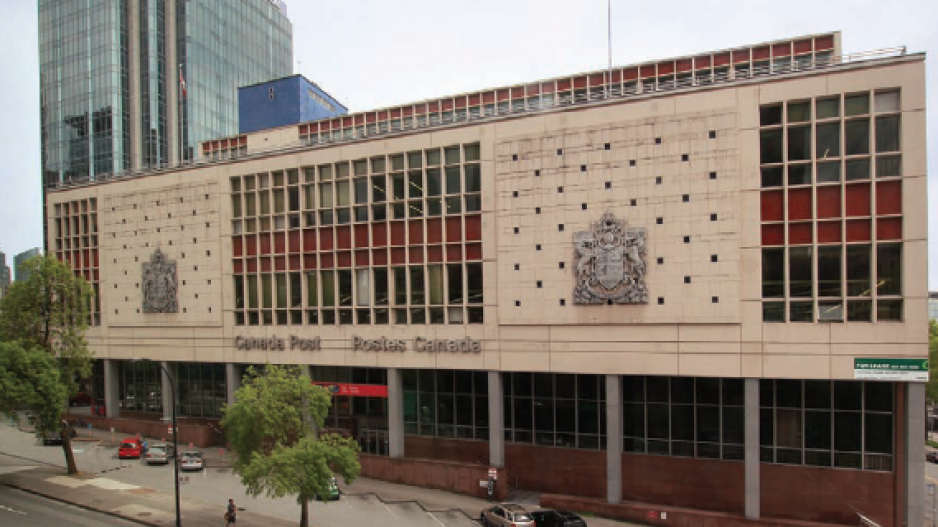Going postal
Warehouse and office space in Vancouver’s landmark downtown post office has attracted director Chris Haddock, who begins filming his much-anticipated CBC drama The Romeo Section this month.
Haddock has taken space in the labyrinthine structure for the series, which chronicles the lives of spies who cultivate romances to secure intelligence. Production, according to the Directors Guild of Canada, runs from July 9 to October 19.
Tony Astles, executive vice-president of Bentall Kennedy LP (which manages the property on behalf of owner BC Investment Management Corp.), said Canada Post’s relocation to the airport and the time required to rezone the property have left a window during which space is available in the building.
Given that a landlord abhors a vacancy, efforts have been made to lease up part or all of the space.
“We have been marketing to tenants that would like an interim use,” Astles said. “We have had some good response from the film industry; we have some warehousing-type tenants, we have office-type tenants.”
Canada Post continues to operate a retail outlet on site, while the deal with Romeo Section Production Inc. takes another chunk. (Astles declined to provide details.)
“They’re using some office space and the warehouse area,” he said.
Other tenants will be welcomed as they come along, but leases will be short-term arrangements.
“We don’t want to extend leases in a manner that would implicate our development process,” Astles said.
Going north
Most investors aim to prevent deals from going south, and in the case of Anthem Properties Group, that aim summarizes its entire raison d’etre.
“We’re in the business of creating wealth,” remarked Bob Tattle, vice-president, business development, with Anthem during a panel discussion commercial real estate association NAIOP hosted in June.
While some investors aim for wealth preservation, Tattle said Anthem wants to make something of what it’s got, and that’s presented a challenge in a market with few available assets and plenty of cash – a significant amount of it flowing in from offshore – competing for what’s on offer.
“There’s no upside; for us, that’s the biggest fundamental change in the market,” he said, candidly.
This has prompted Anthem to focus on development projects, such as the makeover of Station Square in Burnaby, a joint venture with the residential division of Beedie Development Group, as well as Thurston Street (also in Burnaby) and Rockwoods in Surrey. Anthem recently went firm on a development site in North Vancouver, a deal set to close in September.
“Historically we’ve been an investment company that’s started becoming a development company. I think in 2015, ’16, ’17, we’ll be a development company that might dabble in investment,” Tattle said. “We have to create wealth. And it’s really, really hard to create wealth buying assets right now.”
Going cottaging
Architect Bing Thom’s fear back in 2006 that Vancouver was becoming a resort city does a disservice to recreational properties across the province, which often come at a fraction of the price of a downtown condo – though a lakeside or forest cabin has a far different package of amenities than a stylish pied-à-terre overlooking False Creek or Stanley Park.
But compare for yourself: according to Royal LePage, retreats in the Gulf Islands range anywhere from $100,000 to $2 million, while an Okanagan escape pad ranges from $300,000 to $1.5 million.
Re/Max offers a slightly better proposition, citing median prices in the range of $780,000 to $790,000 for waterfront properties in Penticton, the Gulf Islands and Ucluelet, while Whistler and Tofino deserve a look from those willing to consider a median price of $1.3 million and $1.7 million, respectively.
And if those prices sound steep, they reflect a general increase in the value of recreational properties across the country – but the good news is that prices in the South Okanagan have actually dropped a touch.
The optimism in the market has spurred the launch of projects including the 129-unit Creekside Mills at Cultus Lake by Frosst Creek Developments Ltd. and Harrison Highlands by Odessa Group in the Fraser Valley, as well as a second phase of Skaha Hills, a joint venture of Greyback Construction Ltd. and Penticton Indian Band Development Corp. on the benchlands above Penticton. •




